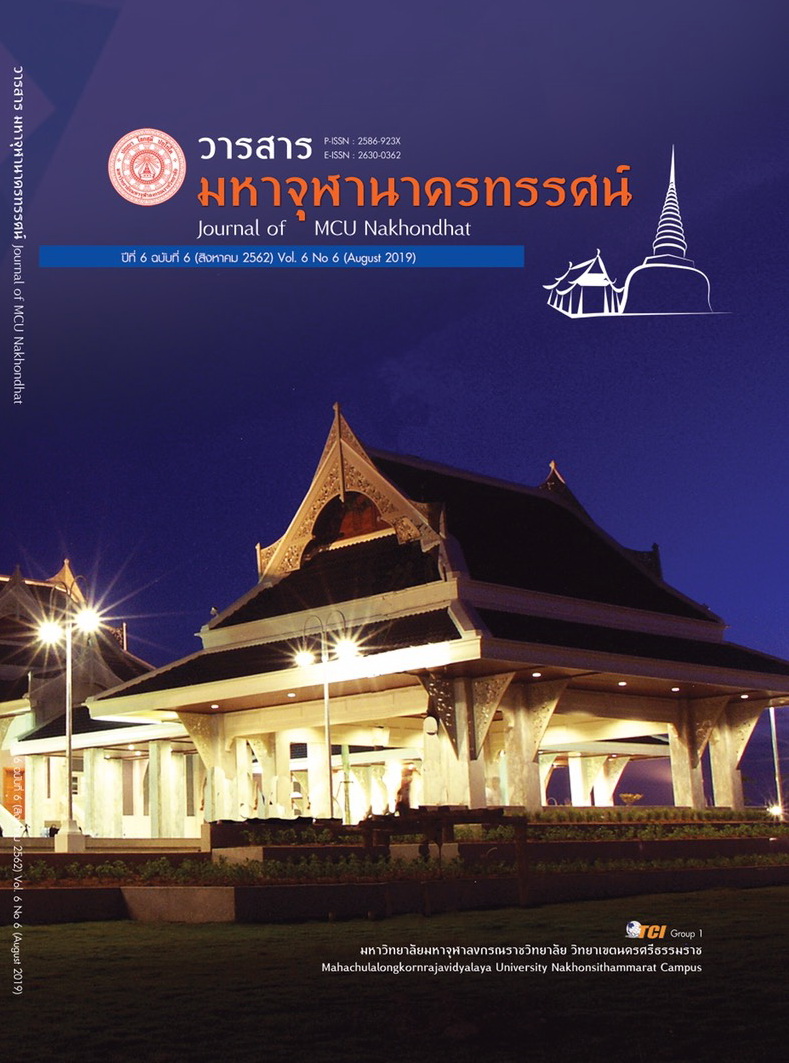MODEL OF BUDDHIST ETHICAL LEADERSHIP DEVELOPMENT FOR ELEMENTARY SCHOOL ADMINISTRATORS UNDER OFFICE OF THE BASIC EDUCATION COMMISSION
Main Article Content
Abstract
The objectives of this study were: 1) to study the current conditions and problems of Buddhist leadership characteristics for Primary School Directors under Office of Basic Education Commission, 2) to develop and to suggest a model for leadership traits development of Buddhist leadership characteristics for Primary School Directors under Office of Basic Education Commission. The methodology of the study was mixed method research. Population includes elementary school administrators’ academics and school board members under Office of The Basic Education Commission, located in the inspection area no 18 number 4305 people set the sample by opening the Yamane (1973) for 366 people. The use in the research is a set of questionnaires. A. inquire for the school administrator B.E. educational institution analyze data by using percentage analysis, average value, development of Model of Buddhist Ethical Leadership Development for Elementary School Administrators by struggling interview and group discussion (FGD) assess the suitability and feasibility of a number of qualified and relevant person 9 people.
The results were that:
- the Buddhist leadership for School Directors rules which were classified into 3 groups, firstly, the 6 high Buddhist leadership for School Directors features which were: 1) Maddava (gentleness), Khanti (forbearance), Avihimsa (non-violence), Tapa (self-controlling), Pariccāga (altruism), and Akkodha (non-anger). Secondly, a medium Buddhist leadership for School Directors feature which was the Sīla (morality). The final group was the 3 low Buddhist leadership for School Directors features which were: 1) Avirodhana (uprightness), 2) Ājjava (honesty), and 3) Dāna (charity).
- The nine in-depth interviews and focus groups in order to evaluate, the most appropriate a Buddhist Leadership Development Model for Primary School Directors under Office of Basic Education Commission found that the 3 low Buddhist leadership for School Directors features which were: Avirodhana (uprightness), Ājjava (honesty), and Dāna (charity). Therefore, the model of Buddhist Leadership development methods of Primary School Directors under Office of Basic Education Commissionwas comprised of 3 steps which were: Avirodhana (uprightness) is practicing yourself in development mind activities and learning from practice, Ājjava (honesty) is being honest and sincere towards others by practicing yourself in development mind activities and learning from practice, and the Dāna (charity) is practicing yourself in development mind activities and learning from practice.
- This research obtained the verify and evaluate the appropriateness and feasibility of the Buddhist Leadership Development completed model for Primary School Directors under Office of Basic Education Commission.
Article Details
References
ไพโรจน์ พรหมมีเนตร. (2552). รูปแบบการพัฒนาภาวะผู้นำทางการศึกษาตามหลักพุทธธรรม. ใน รายงานการวิจัย. มหาวิทยาลัยนเรศวร.
ว.วชิรเมธี. (2552). ภาวะผู้นำ จาก เนลสัน มันเดลา ถึงโอบามาแห่งทำแนบขาว. กรุงเทพมหานคร: สถาบันวิมุตตยาลัย.
วรภาส ประสมสุข. (2554). หลักการบริหารการศึกษาตามแนวพุทธธรรม. ใน ดุษฎีนิพนธ์ศึกษาศาสตรดุษฎีบัณฑิต สาขาการบริหารการศึกษา. มหาวิทยาลัยนเรศวร.
สำนักงานคณะกรรมการการศึกษาขั้นพื้นฐาน. (2560). ข้อมูลเกี่ยวกับ ผู้บริหารสถานศึกษา ครูวิชาการ และประธานคณะกรรมการสถานศึกษา สังกัดสำนักงานคณะกรรมการการศึกษาขั้นพื้นฐาน (กำแพงเพชร พิจิตร นครสวรรค์ และอุทัยธานี). กรุงเทพมหานคร: สำนักงานคณะกรรมการการศึกษาขั้นพื้นฐาน.
สำนักงานคณะกรรมการการศึกษาแห่งชาติ. (2552). พระราชบัญญัติการศึกษาแห่งชาติ พ.ศ.2542 และแก้ไขเพิ่มเติมฉบับที่ 2 พ.ศ.2545. กรุงเทพมหานคร: พริกหวานกราฟฟิก.
สำนักงานคณะกรรมการข้าราชการครูและบุคลากรทางการศึกษา. (2550). คุณธรรมนำความรู้ รูปแบบการเรียนการสอนแบบบูรณาการคุณค่าความเป็นมนุษย์. กรุงเทพมหานคร: วี.ที.ซีคอมมิวนิเคชั่น.
สำนักงานคณะกรรมการพัฒนาเศรษฐกิจและสังคมแห่งชาติ. (2560). สรุปสาระสำคัญแผนพัฒนาเศรษฐกิจและสังคมแห่งชาติ ฉบับที่ 12 พ.ศ. 2560 - 2564. กรุงเทพมหานคร: สหมิตรพริ้นติ้งแอนด์พับลิชชิ่ง จำกัด.
สำนักงานเลขาธิการสภาการศึกษา. (2560). เป้าหมายยุทธศาสตร์และตัวบ่งชี้การปฏิรูปการศึกษาในทศวรรษที่สอง (พ.ศ.2552-2561). กรุงเทพมหานคร: กระทรวงศึกษาธิการ.
สิวลี ศิริไล. (2550). ความรู้เบื้องต้นเกี่ยวกับความคิดการใช้เหตุผลและจริยธรรม. ใน เอกสาประกอบคำบรรยาย ณ มหาวิทยาลัยสวนสุนันทา. มหาวิทยาลัยสวนสุนันทา.
สุเทพ พงศ์ศรีวัฒน์. (2550). ภาวะผู้นำเชิงจริยธรรม (Ethical Leadership). วารสารดำรงราชานุภาพ, 23(7), 57-62.
อรพินธ์ สพโชคชัย. (2541). สังคมเสถียรภาพและกลไกประชารัฐที่ดี (Good Government). ใน เอกสารรายงาน TDRI ฉบับที่ 20 เดือนมกราคม 2541. สถาบันวิจัยเพื่อการพัฒนาประเทศไทย.
อุทัย โล้วมั่นคง. (2553). การนำเสนอแนวทางการพัฒนาคุณลักษณะภาวะผู้นำทางจริยธรรมตามแนวพุทธศาสนาของผู้บริหารสถานศึกษา สังกัดสำนักงานคณะกรรมการการศึกษาขั้นพื้นฐาน. ใน ดุษฎีนิพนธ์ครุศาสตรดุษฎีบัณฑิต สาขาบริหารการศึกษา. จุฬาลงกรณ์มหาวิทยาลัย.
Karianne Kalshoven. (2010). Ethical Leader Behavior and Big Five Factors of Personality. Journal of Business Ethics, 100(2), 349-366.
Thomas, J. Sergiovanni. (1992). Moral Leadership : Getting to the Heart of School Leadership. San Francisco: Jossey Bass.

